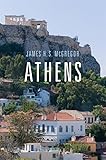Athens / James H. S. McGregor.
Material type: TextPublisher: Cambridge, MA : Harvard University Press, [2014]Copyright date: ©2014Description: 1 online resource (254 p.) : 49 halftones, 4 mapsContent type:
TextPublisher: Cambridge, MA : Harvard University Press, [2014]Copyright date: ©2014Description: 1 online resource (254 p.) : 49 halftones, 4 mapsContent type: - 9780674047723
- 9780674369450
- 949.5/12 23
- DF919 .M35 2014eb
- online - DeGruyter
- Issued also in print.
| Item type | Current library | Call number | URL | Status | Notes | Barcode | |
|---|---|---|---|---|---|---|---|
 eBook
eBook
|
Biblioteca "Angelicum" Pont. Univ. S.Tommaso d'Aquino Nuvola online | online - DeGruyter (Browse shelf(Opens below)) | Online access | Not for loan (Accesso limitato) | Accesso per gli utenti autorizzati / Access for authorized users | (dgr)9780674369450 |
Browsing Biblioteca "Angelicum" Pont. Univ. S.Tommaso d'Aquino shelves, Shelving location: Nuvola online Close shelf browser (Hides shelf browser)

|

|

|

|

|

|

|
||
| online - DeGruyter American Railroads : Decline and Renaissance in the Twentieth Century / | online - DeGruyter American Tax Resisters / | online - DeGruyter America’s Forgotten Constitutions : Defiant Visions of Power and Community / | online - DeGruyter Athens / | online - DeGruyter Between Pagan and Christian / | online - DeGruyter Capital in the Twenty-First Century / | online - DeGruyter Citizens Divided : Campaign Finance Reform and the Constitution / |
Frontmatter -- Contents -- Maps -- Introduction -- 1. On the Rock -- 2. The Acropolis in the Fifth Century -- 3. The Athenian Agora -- 4. On the Perimeter -- 5. Hellenistic and Roman Athens -- 6. Late Antique and Medieval Athens -- 7. The War for Independence and the Creation of a National Capital -- 8. Modern Athens -- Further Reading -- Acknowledgments -- Index
restricted access online access with authorization star
http://purl.org/coar/access_right/c_16ec
Revered as the birthplace of Western thought and democracy, Athens is much more than an open-air museum filled with crumbling monuments to ancient glory. Athens takes readers on a journey from the classical city-state to today's contemporary capital, revealing a world-famous metropolis that has been resurrected and redefined time and again. Although the Acropolis remains the city's anchor, Athens' vibrant culture extends far beyond the Greek city's antique boundaries. James H. S. McGregor points out how the cityscape preserves signs of the many actors who have crossed its historical stage. Alexander the Great incorporated Athens into his empire, as did the Romans. Byzantine Christians repurposed Greek temples, the Parthenon included, into churches. From the thirteenth to fifteenth centuries, the city's language changed from French to Spanish to Italian, as Crusaders and adventurers from different parts of Western Europe took turns sacking and administering the city. An Islamic Athens took root following the Ottoman conquest of 1456 and remained in place for nearly four hundred years, until Greek patriots finally won independence in a blood-drenched revolution. Since then, Athenians have endured many hardships, from Nazi occupation and military coups to famine and economic crisis. Yet, as McGregor shows, the history of Athens is closer to a heroic epic than a Greek tragedy. Richly supplemented with maps and illustrations, Athens paints a portrait of one of the world's great cities, designed for travelers as well as armchair students of urban history.
Issued also in print.
Mode of access: Internet via World Wide Web.
In English.
Description based on online resource; title from PDF title page (publisher's Web site, viewed 30. Aug 2021)


